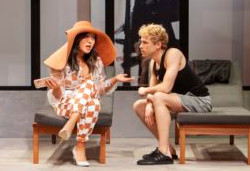
TWO VIEWS OF "DADDY"
From
March 5 to 31, 2019
In the 21st century, when a play is subtitled "A Melodrama,” we have every right to believe it's going to be somewhat satirical. And in this respect, Jeremy O. Harris's "Daddy” does not disappoint. His new play, a collaborative effort of The New Group and Vineyard Theatre, directed by Danya Taylor, skewers a broad range of modern betes noires: materialism, the art world, egotism, sexual identity, racism. But by the end of the play, it's hard to tell exactly where the core beliefs of the playwright lie. The story revolves around Franklin (Ronald Peet), a young, black, gay emerging artist who has found both a patron and a lover in the wealthy, white art collector, Andre (Alan Cumming). Their relationship is fraught from the beginning. It's torrid and sadomasochistic. Both men have daddy/son issues. The play is on the edge (it's not clear which side) of porn. Most of all it's very wet. This is not a metaphor. The Linney Theatre stage is dominated by a large rectangular pool into which Franklin and Andre are not the only ones constant plunging (clothed and unclothed).
Franklin's pals, Max (Tommy
However, the reaction of Franklin's two friends is a mere summer squall compared to his mother's response. She comes to visit Franklin, a whirlwind, complete with her own gospel choir (Carrie Compere, Denise Manning, Onyie Nwachukwu). Indeed, the choir's and Woodard's musical contributions may be the best aspect of the play. Now we learn the history behind all Franklin's daddy issues. And the play takes on something of a tragic aura that does not exactly fit its flippant beginning. Given the obscure nature of "Daddy,” it's no wonder most of the actors seem to be floundering, even the formidable Cummings, who never seems to quite figure out who Andre is or what he wants. Hari Nef, who plays Alessia, the overexuberant caricature of a gallery owner, might be fine in a different play. Only Woodard is able to rise above the general confusion (perhaps because hers is the best written character) and give us a mother tormented by her past and troubled by her son's future. Most certainly there will be people who see "Daddy” and intuit great depth and wisdom. (Is the constantly bleating telephone a message from God?) The play has the sophisticated veneer (Matt Saunders's set, Isabella Byrd's lighting design and Lee Kinney's sound design are exemplary) that always impresses. But let's not let the surreal and fantastic nature of the play confuse us. There is a difference between revelation and self-indulgence.
From
March 5 to 31, 2019
In the early scenes of “Daddy,” a new play by Jeremy O. Harris (“Slave Play”), Franklin is preparing for an opening of a one-man show that features small cloth dolls of black children. By the end of the play, Franklin’s new show features giant dolls that resemble Andre, his white lover, his mother, and himself. The cloth sculptures are a metaphor. Harris is a talented playwright who has no fear of taking wild, creative spins. It is refreshing. But he is also at the beginning of his career so while “Daddy” is almost 3 hours long, the coming of age theme is not clear until the last hour. Meanwhile we are treated to some satirical portraits of Franklin’s friends, a hot love story, a disapproving church-going mom who is full of surprises, a gospel choir, and a swimming pool that gets a work-out. Advice: You may not want to sit in the first three rows. At the beginning the play seems to be about an aging art collector who is white and a young, handsome black artist. We get to see both of them in the all-together – as they might be in a private Bel Aire pool deck. Andre (Alan Cumming in another perfect performance), the dealer, is clearly besmitten. When Franklin, fueled by Andre’s attention and too much wine, launches into a critique of Andre’s artwork, the dealer is enchanted. He wants to see the world through Franklin’s eyes and promises to re-arrange his residential collection. By the second or three acts, the new paintings are in place. Andre’s every move emboldens Franklin. He offers the young man his full contact list, funding, a new workshop, and parties where important people meet and greet. The predator as fairy godfather. But the sex becomes strange. Franklin calls Andre “Daddy,” and Andre likes it. It becomes their role play. When Zora, Franklin’s mom, arrives, we learn that Franklin never got to know his father, and the hunger remains. The man who seemed a predator and fairy godfather begins to see like Franklin’s psychological passage to manhood.
Andre is gracious and, despite The acting was so good! Franklin’s mom is a perfect fit for Charlayne Woodard’s (“Ain’t Misbehavin’”) gifts and then some. Ronald Peet as Franklin was charismatic and convincing although the hint of psychological damage – banging his head—was hard to configure into the whole. (Was that in the script or director Danya Taymor’s choice?) Actor Kahyun Kim turned Bellamy’s mindless superficiality into delicious humor and managed, even while cajoling goodies, to be interesting. A marvelously alive supporting performance! I wasn’t crazy about the pool, particularly when the characters waded around in it fully clothing for no clear reasons. There is nothing like an odd directorial choice to shift the audience out of the play. Lots of frontal nudity, which was at times a little too in your face. |
| recordings | coupons | publications | classified |




